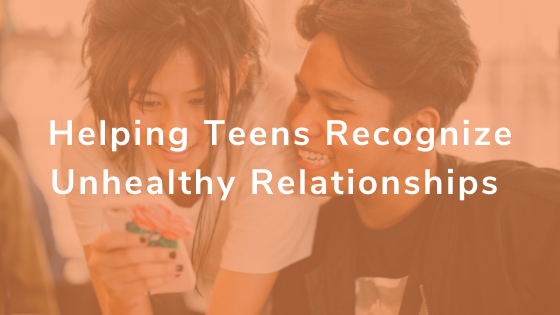Helping Teens to Recognize Healthy and Abusive Relationships
By Lesley Coghill, LMSW-Macro
Resilience Prevention & Systems Change Manager
February is known best for Valentine’s Day and showing those we love how much we care about them as friends, family, or significant others. February is also Teen Dating Violence Awareness Month and the perfect time to talk about what healthy and respectful relationships should look and feel like.
As supportive adults – such as parents, guardians, educators, mentors, and coaches – we can reinforce positive relationship behaviors in the lives of teens. Knowing what to say about dating violence and relationships can feel challenging sometimes or even uncomfortable to talk about. These resources are meant to help demystify how to have meaningful conversations with teens about healthy and abusive relationship behaviors.
How can we best support teens? Being open, honest, and authentic is key to building trust with youth and allowing them to openly share about their relationship concerns or questions they might have about dating.
Respond with love. It is important to respond with love and understanding when teens disclose having experienced dating violence or come to us with questions about abusive behaviors they have witnessed among their peers. Avoid responding with shock, blame, or anger. Be ready to listen. Express that you care for their safety and well-being. We might say, “Thank you for sharing this with me. I care about you and your safety.”
Listen with empathy and support. Teens are likely to feel supported and trusted when we believe their experiences without judgement. Empathy goes a long way in conveying that we believe and support them as they navigate their next steps forward. We might say, “That must have been very difficult for you.” Or “It must have taken you a lot of strength to get through that.” We can offer suggestions for next steps like seeking help, but it is very important to stay present as we listen to them and try not to “fix it.” Allow the teen space for processing their experience.
Reinforce respectful relationships. We can talk often about healthy and unhealthy relationships, whether we are educating teens as a preventative measure or responding to a disclosure of dating violence. There are many helpful online resources that can provide guidance to assist us in having meaningful conversations with teens to reinforce respectful relationships. This might include watching healthy relationship videos, looking at helpful websites, or taking relationship quizzes together. These resources might prove useful in starting the conversation.
- Resilience created a dating violence handout with tips for supporting teens: How Can I Help? Supporting Teens Experiencing Dating Violence.
- One Love Foundation defines the 10 signs of a healthy relationship as: Comfortable Pace, Trust, Honesty, Independence, Respect, Equality, Kindness, Taking Responsibility, Healthy Conflict, and Fun. The 10 signs of an unhealthy relationship include: Intensity, Possessiveness, Manipulation, Isolation, Sabotage, Belittling, Guilting, Volatility, Deflecting Responsibility, and Betrayal.
- Love Is Respect developed The Relationship Spectrum to show how relationship behaviors can move from healthy to unhealthy or abusive.
Take the interactive Relationship Spectrum quiz together and discuss the scenarios.
Learn more about the warning signs of abuse and take the Healthy Relationship quiz.
Printable one-page handouts to share:
10 Unhealthy Relationship Signs
Resilience: Advocates for Ending Violence has advocates available 24 hours a day to provide support for people who are experiencing dating abuse. By calling the Help Line, you will be connected with a trained professional that has the expertise and resources to help survivors move forward in whatever way they choose.
To speak to an advocate, call:
1-800-848-5991
Spanish: 1-866-728-2131
E-mail: GinnyP411@gmail.com
